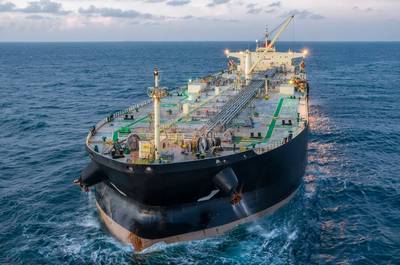Shipping Companies Turn to Longer-Term Leases as Tanker Supply Tightens
Rising oil tanker chartering rates due to global shipping disruption are forcing oil shippers to take on longer-term shipping charters, executives said this week at an energy conference in Houston.
The global oil tanker fleet must now travel further to get crude to refineries and fuel to consumers. European sanctions have forced Russian exporters to send oil to Asia that would have otherwise gone to Europe. Attacks on vessels in the Red Sea have forced some shippers to sail around Africa.
Low water levels in the Panama Canal have also led some vessels to take alternative routes.
The detours have added up to three weeks sailing time to some routes, adding significantly to shipping costs and reducing vessel availability. Some ships are no longer available because they have joined the fleet carrying Russian oil or have been sanctioned.
All of that has added up to 26% to tanker chartering rates in some cases. Insurance rates have skyrocketed for those shippers that still transit the Red Sea to save time.
Chartering rates for an Aframax vessel, which can carry up to 800,000 barrels, have surged to about $49,500 per day from $39,000 a day five months ago, according to shipping data.
"It's just kind of been a perfect storm," said Andrew Jamieson, co-head of Gunvor Group's chartering and shipping arm, Clearlake Shipping.
"There are not enough vessels."
To save money on ship chartering, Gunvor has taken on more longer-term charters on ships, he said.
"The record time-chartering rates are a pain," Jamieson said. Time chartering contract allow companies to take a vessel for a given period of time rather than on a specific voyage between two location, protecting them from the cost of disruptions.
Clearlake Shipping has entered into more long term deals as well, partly due to 50-60% volatility in 10 month-front contracts. Locking in time charter contract in advance are typically cheaper than nearer-term contracts and protects the company from volatility in price.
"We don't like doing it, but we think rates are here to stay."
The company has over 100 time-charter contracts now compared with a few prior to 2020, he added.
Some operators also use hedges to lock in prices. Interest in forward freight agreements - futures contracts that allow participants to trade on an expected future level of freight rates - have risen in recent months, industry sources said.
The coming expansion of Canada's Trans Mountain pipeline will add further demand to the tanker market. Vessels will be needed to take crude from the Pacific Coast terminal of the pipeline to refiners.
Vessels avoiding the Red Sea have increased marine fuel consumption by 100,000 barrels per day and added 3% to the distance traveled by the global shipping fleet, Vitol CEO Russell Hardy said on Wednesday.
To ease the shortage in the market, companies are also looking to build new vessels.
About 100 Aframaxes are likely to enter the market in the next three years, while about 25 Very Large Crude Carriers will enter the market in 2027, Clearlake's Jamieson said.
Most of the factors that have forced ships to sail longer routes are unlikely to change any time soon, said Geoff Houlton, a senior vice president at U.S. oil producer Occidental Petroleum.
A "chunk of these suboptimal trade flows" are probably here to stay, he said.
(Reuters - Reporting by Arathy Somasekhar in Houston and Lisa Baertlein in Los Angeles; Editing by Gary McWilliams, Simon Webb and David Gregorio)













